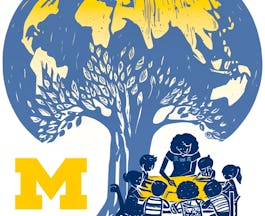What You’ll Learn
Analyze global, national, and local educational contexts in collaboration with global colleagues.
Collaborate with colleagues to develop visions for educational access, quality, and equity that heed global calls for educational transformation.
Devise comprehensive, inclusive blueprints for local innovation that engage diverse local stakeholders.
Practice rigorous methods of collaborative, continuous improvement to address local educational priorities.
Skills You’ll Gain
Shareable Certificate
Earn a shareable certificate to add to your LinkedIn profile..
Develop Your Specialized Knowledge
Learn in-demand skills from university and industry experts
Master a subject or tool with hands-on projects
Develop a deep understanding of key concepts
Earn a career certificate from University of Michigan
4 courses series
Series Orientation welcomes learners to the Transforming Education series, introduces Self-Directed/Community-Supported Learning as our core instructional design, and positions learners for success as aspiring change agents.
Envisioning Educational Transformation supports aspiring change agents in moving beyond the status quo by building new ambitions for educational access, quality, and equity in their local contexts, with a specific focus on identifying relationships among global, national, and local agendas for systems transformation. You will engage with leading policymakers and researchers to understand global and national policy discourses about educational transformation, and you will collaborate with course colleagues in cross-national comparisons of ambitions for educational access, quality, and equity to fuel your creativity and motivation. You’ll then engage in local systems analyses and lead a local “visioning conversation” with the aim of building shared ambitions for educational transformation in your local context.
Reimagining Educational Innovation introduces local change agents to collaborative, continuous improvement – a locally grounded approach to innovation that empowers teachers, leaders, families, and community members to advance new ambitions for educational access, quality, and equity. Learners disrupt common conceptions of educational innovation as the exclusive province of policy, academic, and market actors, and explore how collaborative, continuous improvement empowers local innovators to address local educational opportunities, needs, and problems. Participate in a “virtual world tour” of collaborative, continuous improvement as enacted in diverse national contexts by teachers, family and community members, and school and system leaders, with guidance from leading researchers and support partners. Throughout, learners work systematically to construct a new, inclusive image of educational innovation in their local contexts anchored in norms of mutual respect, relational trust, and collective empowerment.
Practicing Collaborative, Continuous Improvement supports local change agents in developing foundational capabilities for iterative analysis, design, implementation, and evaluation. Learn to address local needs, opportunities, and problems, with a focus on improvement science as a specific approach to collaborative, continuous improvement that is useful in classrooms, communities, schools, and systems. Under the guidance of leading researchers, learners develop capabilities to map systems that underlie persistent educational problems; identify a shared theory of (and ideas for) improvement; iteratively implement, measure, and refine potential solutions using plan-do-study-act cycles; and sustain and spread improvement within and beyond their local contexts. Learners also compare such work as enacted in improvement science and other approaches to collaborative, continuous improvement. Learners then develop a detailed plan for initiating a local improvement project to advance new ambitions for educational access, quality, and equity in their local contexts.




